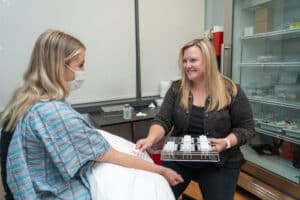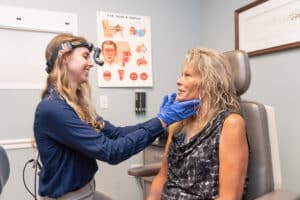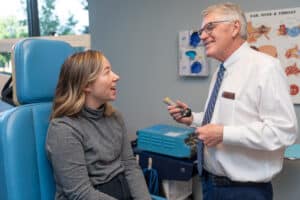Head & Neck
Head & Neck Treatments
Neck Tumors
At Boulder Valley Ear Nose and Throat we treat all types of head and neck tumors (benign or malignant). Whether the problem arises in the thyroid, parotid, submandibular gland, or is a head and neck cancer, the surgeons of Boulder Valley Ear, Nose and Throat are expert at managing these issues.
Thyroid Tumors
Tumors arising from the thyroid gland can be benign or malignant. There is no way to definitively know if a tumor is cancerous without removing the involved portion of the gland and checking with a pathologist. Statistically, most tumors are benign. Some diagnostic testing can be done to help decide how to manage these tumors, but surgical removal remains the only definitive way to establish the diagnosis. High risk groups include women, people over the age of 40, those with a family history of thyroid cancer, and patients with a history of radiation exposure. Thyroid cancer is often very indolent, slow growing and treatable with a high cure rate, especially if caught early. Make sure to consult with a physician if you are experiencing a lump in the neck, difficulty swallowing or breathing, a pain in the neck, or hoarseness.
Parotid and Submandibular Gland Tumors (Salivary gland tumors)
The parotid and submandibular glands are paired (right and left) in the neck and help produce saliva. Tumors can develop in these glands and are usually benign. The only symptom that people will usually notice is a lump or growth in the neck. Surgical removal of these tumors is the mainstay of treatment because it provides a definitive diagnosis, and is usually curative. If the tumor is malignant, other forms of therapy may also be recommended.
Head and Neck Cancer
Head and neck cancer includes cancers of the mouth, nose, sinuses, salivary glands, thyroid, throat, skull base, and lymph nodes in the neck. Concerning symptoms include a lump or growth that does not heal, a sore throat or pain that lasts more than 2 weeks, trouble swallowing, a change in the voice or hoarseness, unexplained weight loss, loss of appetite, one sided ear pain, or trouble chewing.
Using tobacco and/or alcohol increases your risk. In fact, 85 percent of head and neck cancers are linked to tobacco use, including smoking and smokeless tobacco. If found early, these cancers are often curable. Treatments may include surgery, radiation therapy, chemotherapy or a combination. Treatments can adversely affect eating/swallowing, speaking or even breathing, so patients often need rehabilitation.
This is not a comprehensive list of symptoms or a complete discussion. Please come in and talk with us for any symptoms in the head and neck area that last for more than 2 weeks.
Tongue Cancer
Tongue cancer develops when abnormal cells grow out of control and form lesions or tumors on the tongue. While it can occur in anyone, men over 40 with a history of heavy alcohol and tobacco use are more likely to develop tongue cancer. It is typically discovered during routine dental exams, another reason to stay on top of regular dental visits and cleanings. Symptoms of tongue cancer may include discoloration of the tongue, persistent sore throat, tongue numbness, bleeding, sores or lumps on the tongue that don’t go away, and painful swallowing. Surgery that removes the cancerous cells but maintains the natural function of the tongue is the mainstay of treatment for tongue cancer but more advanced cancers may also require radiation and/or chemotherapy. If large tumors need to be removed, reconstructive surgery of the tongue and oral cavity will likely be arranged as well.
Face and Skin Cancers
Other cancers of the head and neck region include growths that primarily develop on the skin and surrounding structures in the facial region. These cancers often result from excessive, chronic sun exposure, genetic predisposition, or other environmental factors. The most common type of skin cancer to affects this region is basal cell carcinoma, followed by squamous cell carcinoma and melanoma. These cancers usually present as abnormal growths of skin or ulcers that may bleed or change in appearance with time. Early detection is crucial for effective treatment which may involve surgical removal of the lesion and surrounding tissue, radiation, or immunotherapy. Regular skin examinations and sun protection measures are strongly recommended for prevention and early detection. If you or a loved one has a suspicious skin lesion in the head and neck region, do not hesitate to schedule an appointment with one of our ENT specialists as time is of the essence to prevent these cancers from spreading and causing disfigurement or potentially life-threatening complications.
Contact Us Today!
At Boulder Valley Ear, Nose & Throat Associates, we provide the highest quality patient care in a friendly, professional atmosphere. We emphasize personalized customer service, availability, efficiency, honesty and integrity, and attention to detail. We strive to do things the right way at every level, all the time.
If you are concerned about a mass you or another healthcare provider has noticed in the head and neck area, don’t delay, contact us today!










